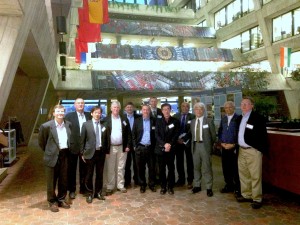
The Nomura delegation also visited Fermilab. From left to right: Dmitri Denisov, Fermilab, Robert Kephart, Fermilab, Masashi Sato, Nomura Research Institute, Mike Harrison, BNL and LCC, Mark Palmer, Fermilab, Nigel Lockyer, Fermilab Director, Sergei Nagaitsev, Fermilab, Yoshitaka Kuno, Osaka Univ., Swapan Chattopadhyay, Northern Illinois Univ., Susumu Kamada, KEK (emeritus)
Hasan Padamsee, Fermilab, Peter Garbincius, Fermilab. Image: Peter Garbincius, Fermilab
A group of Japanese researchers is on a world tour of research institutes. They are working on a study of the technological and economic spin-offs of the ILC project and trends in research around the world in the fields of particle and nuclear fields, commissioned by Japanese funding agency MEXT. Harry Weerts, LCC Director for the Americas, reports from their visit to the US.
The Ministry of Education, Culture, Sports, Science & Technology (for short MEXT) of Japan is responsible for making the case to the Japanese government for realising the ILC in Japan. MEXT is approaching this complex undertaking in a very deliberate way. They have sought initial input on the the ILC from the Science Council of Japan, which was positive, but also recommended that additional questions should be addressed: a) about the scientific case and 2) how to realise such a large international project in Japan, with contributions from many countries. MEXT has also received input on the site selection from a committee of scientists, which evaluated the sites, based on technical considerations. Currently MEXT has formed a committee with two subcommittees , one to study in more details the ILC physics case and an ILC TDR verification committee, to translate the TDR estimates for cost and manpower into Japanese-based estimates that can be used by the Japanese government.
In addition MEXT has initiated a study of the technological and economic spin-offs of the ILC project and trends in research around the world in the fields of particle and nuclear fields. MEXT commissioned the Nomura Research Institute (NRI) to undertake this study. The study consists of two main elements:
(1) A survey and analysis of how the technologies used to produce the accelerator for the ILC project may be used by society in the future and their expected effects
(2) A survey of research plans and programs in particle and nuclear physics in leading countries in North America, Europe, and Asia, and investigation and analysis of the positions that they and their anticipated outcomes occupy in these countries’ science and technology policies.
Several of us were contacted about this survey at the last ICFA seminar in Beijing in the fall of 2014. NRI contacted laboratories and funding agencies in several countries at that meeting. NRI put together a small visiting committee consisting of Yoshitaka Kuno, Professor at Osaka University, Susumu Kamada, professor emeritus at KEK and Masashi Sato, manager at NRI.
In the first two weeks of February this committee visited the following laboratories: Argonne, Fermilab, SLAC and TRIUMF in the Americas and also met with funding agencies in Canada and the US. Another Nomura delegation visited European labs and agencies in January.
The committee spent about half a day at each laboratory and had sent beforehand a list of questions/topics that they wished to address. The list is too long to reproduce here. However after the visits it was clear that they were mainly interested in learning about how large laboratories function, what role they play in a country, about the use of superconducting RF technology now and in the future, and last but not least gauge the interest in the ILC. The visits were all perceived as very useful, with good information exchange. We received a note expressing appreciation for productive interviews with the committee. It also stated that the will continue their interviews in other parts of the world during March and then wrap up. It is expected that NRI will produce a report for MEXT, which will be another step in the process of understanding what it will mean for Japan to host an international project of the scale of the ILC. We are all looking forward to the report.


Recent Comments